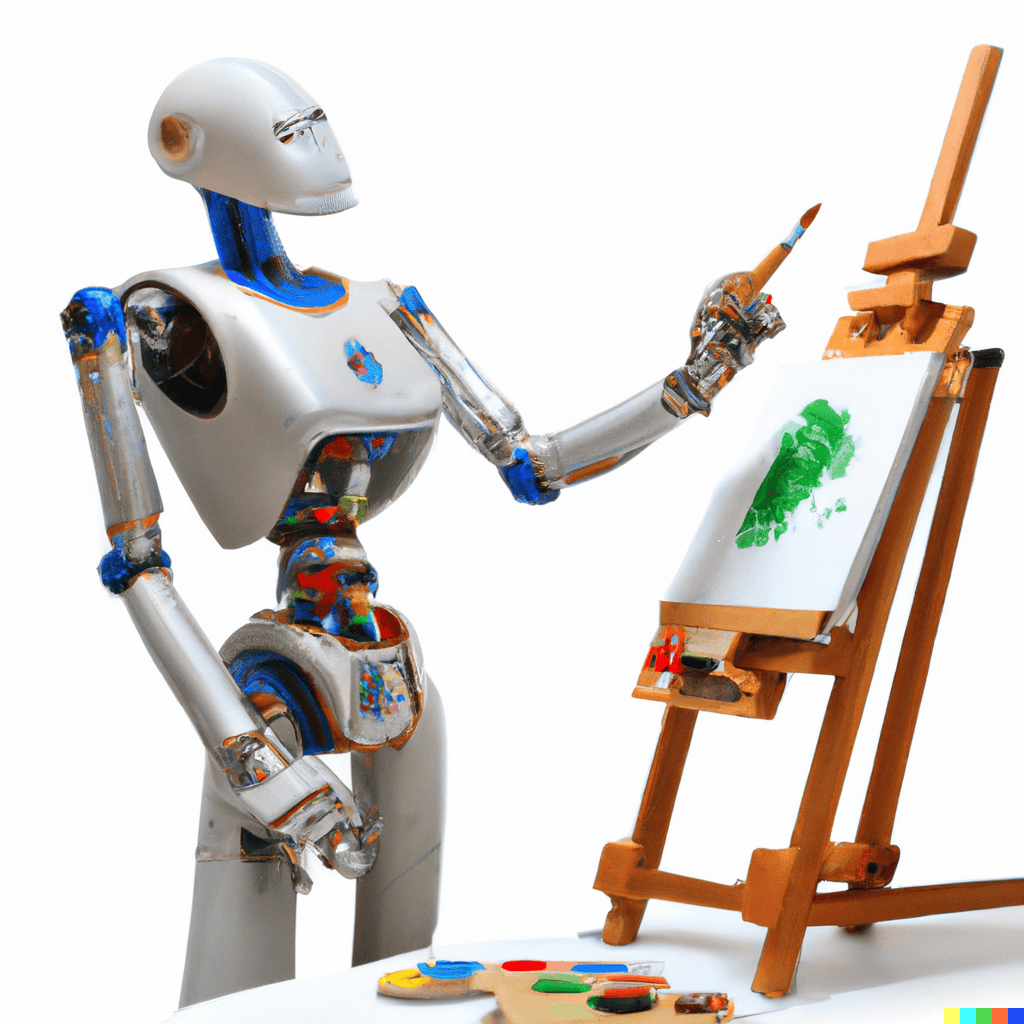This is an important truth that few people agree with…
Creativity is an illusion.
But with advances in AI, more people are coming around to the idea.
The image below is from DALL-E, an image generator that uses text prompts.

Within seconds of typing “a robot painting a picture,” this was one of multiple images. They’re all unique with no humans involved. And to accomplish this feat, DALL-E trained on hundreds of millions of text-image pairs. The first version of DALL-E had 12 billion parameters.
This tool is near state-of-the-art and even better, free for anyone to use.
DALL-E is opening the eyes of millions of people around the world. And as usual, there’s a lot happening behind the scenes – some of which I’ll touch on in future posts.
Objection Handling
With the advent of these image generators, some artists are up in arms. But having no horse in the race, it’s easy to see them as modern-day Luddites. Their livelihoods are at risk.
They argue the software is trained on other artists’ work – without their permission.
However, is it any different when an artist takes inspiration from another artist’s work?
This question sheds light on why I believe creativity is an illusion. Anything we create is based 100% upon our past experiences, along with how we’re biologically built.
All creative work is a product of a system or many systems working together. That includes both mechanical and biological.
Many people don’t want to believe our actions are deterministic.
We’re complex organic systems… but systems nonetheless. And as we better understand any system, we can better predict outputs.
I doubt we’ll ever have a 100% understanding of how we operate. Nonetheless, we’re approaching a limit of understanding.
For many, this truth is a tough pill to swallow. However, opening your eyes to it can be empowering.
Any artist worth their salt should agree with this next statement…
Anyone can take steps to become more “creative.”
Near-Term Risk + Opportunity
Following the release of DALL-E (and ChatGPT), there’s renewed hype for AI. And as usual, some of it’s warranted.
… but the challenge is the timeline.
As these generative technologies advance, they’ll impact every industry. And in the next few years, there’s one major industry at risk.
Google Search will be a big loser if it doesn’t adapt. It’s in a tough position. And the CEO behind it, Sundar Pichai, has reportedly issued a code red to respond to the threat.
Big companies have to be cautious when releasing unproven tech at scale. AI chatbots are still prone to bias that can damage, as well as incorrect results.
Any missteps could be significant and Google has a huge brand to protect. That’s compared to non-profits like OpenAI and other nimble startups.
Google holds roughly 90% of the search market, but other big players like Microsoft are making moves as well. Back in 2019, Microsoft announced a $1 billion investment in OpenAI. And now rumors are swirling that Bing will incorporate some of these new technologies.
I’ll be keeping a close eye out 😉 so stay tuned.
Big Prediction
When looking further out, millions of “creative” roles are at risk. Both small and large creators will be forced to adapt.
Over the past few years, there’s been a mad rush to create content. Amazon, Apple, Disney, Netflix and HBO have pumped fat cash into creating new shows and movies. Here are some rough estimates…
- Game of Thrones Final Season ≈ $15 million per episode
- Stranger Things 4th Season ≈ $30 million per episode
- The Big Bang Theory ≈ $9 million per episode
It’s a great time to be a consumer. But mark my words, it’s going to get much, much better.
By 2047, I’m predicting you’ll be able to generate new shows and movies by request…
“Create a spinoff of Harry Potter with a young Johnny Depp look-alike as the main character.”
Within a few hours or maybe even minutes, you’ll have feature-length film ready to go.
All the while, the cost of this output will be approaching $0 (computing power 📈 energy cost 📉).
We’ve seen some early stages with deepfakes but not to beat a dead horse, it’s just the beginning.
The replacement of voice actors and vocal artists will happen even faster. Emulating voice actors is an easier task to accomplish. And already, Apple recently announced AI narration for audio books.
The signs are piling up for those of us paying attention. Many “creative” jobs are at risk but with history as a guide, many new doors will open.
… will you be ready to step through them?